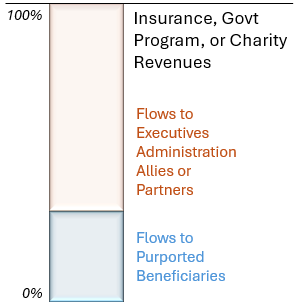Blame: The Original Cryptocurrency
They affix the token of blame, then make it fungible for the benefit of The Party alone
They tie up heavy bundles of blame and place them on men’s shoulders, but they themselves aren’t willing to lift a finger to help, siphoning off from the guilt which flows from the charade.
This entire mechanism is not just analogous to, but an actual form of, loosh extraction—a feeding on the emotional and psychological turmoil of others. Be very cautious of any system which grooms its adherents to develop a taste for loosh.
A value chain strategy is one of the professional disciplines I have honed over the last few decades, applying this methodology across multiple industries and markets. Much of today’s value chain theory was developed by my teams over the past forty years, refined through hundreds of strategy projects for corporations and nations alike.
At its core, a value chain measures organizational or market-chain effectiveness by analyzing the flows of value and risk relative to the flows of revenue and margin. Ideally, any node or entity that draws down margin or entails expense should also contribute value or mitigate risk in proportion—otherwise, it operates as a negative nodal impact. Value chain analysis flags those entities that quietly siphon off margin, value, and risk—or in the context of this article, displace blame—for personal gain, whether for greed, power, or self-aggrandizement.
Today’s agri-food, higher education, and medical industries are prime examples of negative value chains—where inefficiency and parasitism masquerade under the flag of fulfilling vital necessity—holding the victims therein hostage in the process.
Blame was the original cryptocurrency. Virtue signalers simply seek a way to make it fungible.
Throughout history, oppressive structures have thrived on a fundamental hypocrisy: those who impose burdens rarely bear them. The apothegm at the heart of this discussion—”They tie up heavy bundles of blame and place them on men’s shoulders, but they themselves aren’t willing to lift a finger to help, siphoning off from the guilt which flows from the charade.“—is a deliberate re-expression of Jesus’ words in Matthew 23:4. It captures the essence of exploitative leadership and the systemic parasitism that thrives under it. This entire mechanism is not just analogous to, but an actual form of, loosh extraction—a feeding on the emotional and psychological turmoil of others.
The Illusion of Aid
This, of course, does not stand as condemnation of any and all forms of charity or mercy. In the nonprofit sector, the allocation of funds between program services and operational costs varies widely. Charity watchdogs provide benchmarks for financial efficiency, such as Charity Navigator’s standard that at least 75% of a charity’s expenses should be allocated to program services which directly impact the intended recipient and not some middle-entity between donor and beneficiary.1 Yet, very few charities—or government programs—meet this threshold. Many exist primarily to fund their own salaries and revel in the self-satisfaction of their moral role in society.
A prime example can be seen in the Clinton Foundation’s handling of $9 billion in international aid following the 2010 Haitian earthquake. The entire value chain cloaked in virtue, a mere 0.6% of those funds ever reached actual Haitians or relief efforts.2 These people fully understand the art of profiting from suffering—while training an entire class of parasites in the process, from Haitian government officials (who siphoned off 9.6% for themselves) to a new generation of virtue bureaucrats. These are the very same hucksters who now shape U.S. foreign aid and immigration policy—who pin responsibility (after all we are virtuous) for everything from climate to poverty to third world population dumping to ancient-hatred wars squarely and solely on the shoulders of US working citizens.
They affix the token of blame, then make it fungible for the benefit of The Party alone. Neither the value-holder, nor the risk-bearer draw down any of this stolen margin.
This same negative value chain impact is often found in religious institutions that demand piety from their followers while indulging in what I term the abusive excess of the ‘red brick empire’—sprawling institutions that serve more as testimony as to ‘how much the God of Empires loves our club’ than one of true faith.
Such abusive grandstanding often serves to decimate the private mindset of those who silently conclude in comparison that God apparently does not love them so much. So they give even more in penance, hoping to earn back that love (even though they would be the last to admit this), or conclude that all spirituality is merely a farce to begin with. This cycle of abuse of the innocent (loosh) quietly percolates behind the scenes of all the glitz, Pollyanna, and broadcast glamor.
Be very cautious of any system, religious or otherwise, which grooms its adherents to develop a taste for loosh.
It manifests in bureaucracies that enforce labyrinthine regulations on the working class while exempting the elite, or government programs entitled with a mission to help those in need, yet only benefiting their political allies in reality. It pervades political systems where lawmakers impose austerity on the people while securing privileges for themselves. In every case, a ruling class constructs a framework of obligation, compliance, and hardship—not as a necessity for order, but as a mechanism for control.
The second half of the apothegm I consider to be particularly enlightening: “siphoning off from the guilt which flows from the charade.” Herein resides the real motivation behind these burdens.
The suffering imposed is not incidental—it is engineered to extract value. Manufactured guilt and blame are being commodified, made fungible, and traded like a currency.
A System Designed for Extraction
Whether it be laborers kept in cycles of debt, citizens burdened by ever-expanding taxation, pilgrims flagellating themselves for their imposed ‘sins,’ or employees drained by corporate hierarchies that reward only those at the top, the common theme remains: exploitation masquerading as necessity. Reduce their funding, and they will blame you for the harm they enact on the beneficiaries they hold hostage. Meanwhile the shortfall curiously never seems to affect them—still jet-setting around like great white saviors all the while.
The true measure of leadership is not in the public celebration of those burdens targeted, but in the willingness to shoulder and address them creatively. Those who craft policies should also live by them. Those who demand sacrifice should lead in sacrifice. See the New York Times article: How Elizabeth Warren Built A $12 Million Fortune—which plays the trick of not including off-balance-sheet partnerships, leveraged insurance value, asset appreciation, market value, deferred compensation, warrants, and substitutions-in-kind (all forms of real wealth), that purportedly now amount to north of $70 million in worth for Senator Warren.3 Excluding such real but unstated assets is a common trick of ‘fact checkers.’ A corporation, and that is what a personal estate often is, can easily bear a book value of $12 million, while concealing a market value in excess of $50 million.4
Without this essential value-chain reciprocity, the system devolves into a charade—where the many labor for the spectacle and gain of the few. The issue isn’t whether the system aligns with ‘capitalism,’ but rather its failure to provide real value and mitigate risk. Blame itself becomes a commodity—a kind of crypto token to be cashed in. Any socio-political-economic system can suffer from such failures, generating commensurate levels of human suffering in the process.
The greatest evil is one that dumps the problems of the entire world on your back—and then hands you the bill.
Breaking free from such systems requires more than exposing their hypocrisy; it demands a refusal to sustain them. It requires abstaining from the intoxicating flow of loosh, the emotional energy harvested through manipulation, fear, and guilt. The moment individuals withdraw consent from the illusion, the charade collapses, and the siphon runs dry.
The task at hand is not to take on the fanaticism (the most sincere form of disbelief) of being the world’s savior, a fallacy that Nicholas Kristof perpetuates in the X-post image above. Instead, it is to apply mercy to those within our reach—to operate with authenticity, not letting your right hand know what your left hand is doing, rather than grandiosity. This is faith.
In keeping with Nietzschean philosophy, we must remember: Give a good man all the tools he needs to fight evil, and soon you will find that evil has changed sides.
The Ethical Skeptic, “Blame: The Original Cryptocurrency”; The Ethical Skeptic, WordPress, 15 Mar 2025; Web, https://theethicalskeptic.com/2025/03/15/blame-the-original-cryptocurrency/









Completely awesome, I will need to read again because it is rich with detail. Now I am off to bash Nicholas Krsitof, I know some things about childbirth being female & a retired RN & the granddaughter of a back country midwife who never lost a mom or baby.
So you found a clinic in Sudan that will be closed, which indicates to you USAID should not be shut down. In fact its mission has not be shut down it has been moved under the Department of State. If the clinic was mistakenly shut down State can rectify this. I cannot imagine any sane person thinking USAID as an independent agency, was being administered as was originally devised or in a way to make the American people proud. It was a political organization.